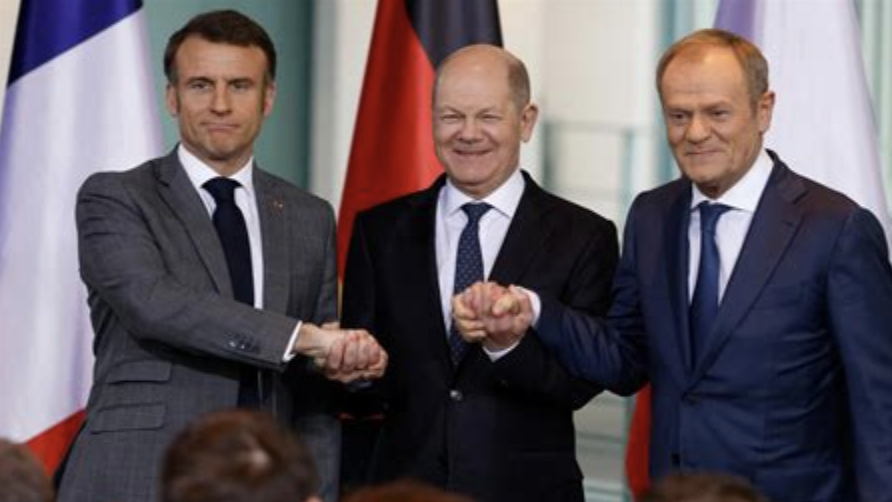Weimar Triangle Draft
By Tillie Morris, 6 minutes.
The re-election of the pro-European Prime Minister in Poland, Donald Tusk, stirs questions about whether the alliance between Poland, Germany, and France will be the stronghold for Europe’s future.
Originating in 1991, the ‘Weimar Triangle’ is a regional alliance between Poland, Germany, and France, which promotes military and scientific cooperation as well as collaboration between inter-parliamentary contacts. Meetings are held between heads of state and government, foreign ministers, ministers of European affairs, and ministers of finance amongst others who do not meet as frequently. A prominent military development has been the Weimar Battlegroup, which is a rapid reaction force, ready to deploy in crisis zones. The composition of the group sees Poland as its leader, as it provides a mechanised battalion and core combat troops, with Germany ensuring logistical support and France fronting medical advice and resources.
In the early 1990s, the Soviet Union collapsed and Poland began its democratic transition. In the Eastern bloc, Poland had significant capacity, with a population in 1991 of 38 million and a land size of above approximately 300,000. Strategically, based on the previous factors, as well as proximity to Ukraine and Russia, it was in the interest of Germany and France to aid Poland’s transition, and eventual integration into NATO and the European Union. Furthermore, it continues to promote European values and encourages unity and stability, which was also mirrored by the Eastern EU expansion.
Although the group had seen developments, it appeared by the late 2010s that the triangle was not as prominent as it previously had been. The decline in the importance of the alliance is likely in part due to the deteriorated relations between the EU and Poland. From 2015 until 2023 the Law and Justice party, frequently described as a national-conservative or populist party, held government. The party expressed their scepticism towards elements of European Union regulation, notably, European defence initiatives. Likewise, the European Commission cited concerns about the “independence of the judiciary and the ‘rule of law’” in Poland under the Law and Justice government. Despite this, the UK’s 2016 EU exit referendum encouraged the group to increase ties.
Nonetheless, previous Polish Prime Minister Mateusz Morawiecki often favoured regional partnerships with the Visegrad group, composed of Hungary, the Czech Republic, and Slovakia. This grouping has been of fundamental importance in resisting components of EU reform and shared similar views on border security and economic objectives . There are significant differences in the general roles that the countries in the Visegrad and Weimar Triangle take within the EU, in terms of EU reform it is unlikely that Poland would align firmly with both groups. However, the Visegrad group is not technically a strategic grouping but rather a cultural and political alliance. The differences between Visegrad and Weimar can be observed, but they are not intended to serve the same purpose; they cannot be seen as completely mutually exclusive.
In 2023, Donald Tusk was elected as Prime Minister for the second time, previously holding office from 2007 to 2014 when Civic Platform topped the Polish parliamentary elections. Prior to his second PM election, Tusk held the position of President of the European Council, making him the first Eastern European politician yo hold this vital role. Tusk also co-founded the centre-right, pro-European Civic Platform party in Poland. Consequently, since in office, Tusk has been shifting Poland’s foreign and domestic policy, claiming he was unsure if the Visegrad group entirely made sense. However, he has acknowledged that there are common interests and a shared history between the quartet and the Soviet Union, but the dis-alignment in the leaders’ stance on the Russian invasion of Ukraine has raised questions for the grouping.
With Tusk’s history within the European Union and growing tension just outside the EU’s borders, it is reasonable to expect the ‘Weimar Triangle’ to grow once again in relevance. A recent triangle summit in Berlin between Tusk, French President Emmanuel Macron, and German Chancellor Olaf Scholz, focused on support for Ukraine, future transatlantic relations, and strengthening the European Union’s defence potential; the trio are due to meet again in Warsaw in early summer for another summit.
Overall, it is not unreasonable to expect Poland’s role within the EU to grow, with the Weimar Triangle as a strong foundation. The Weimar Triangle could prove crucial, especially if they can commit to a uniform approach to the Russo-Ukrainian war.
